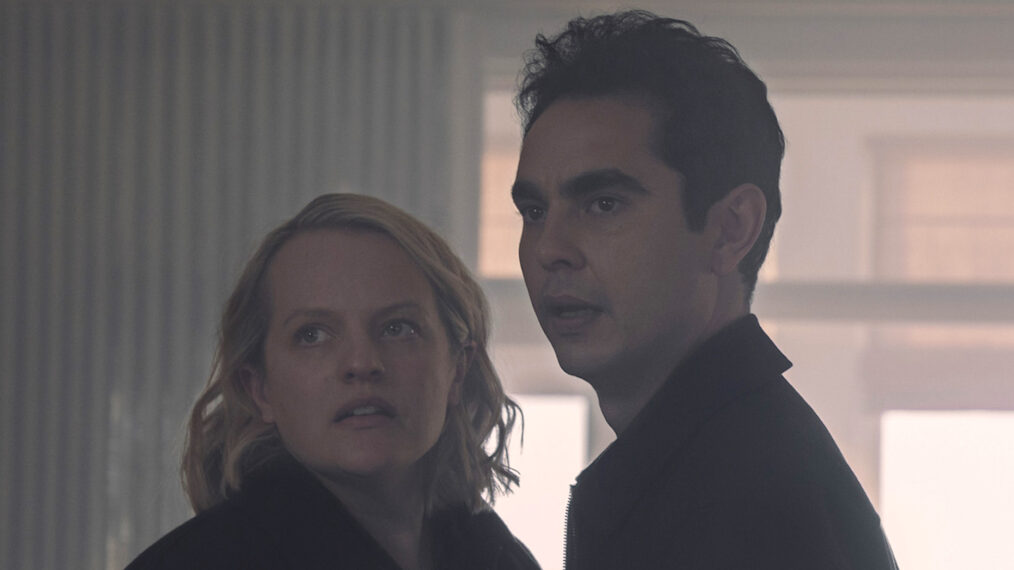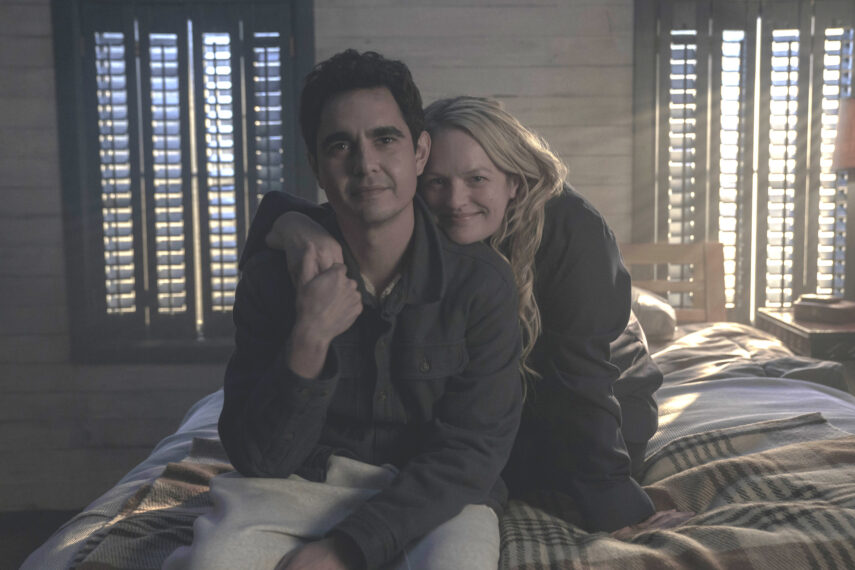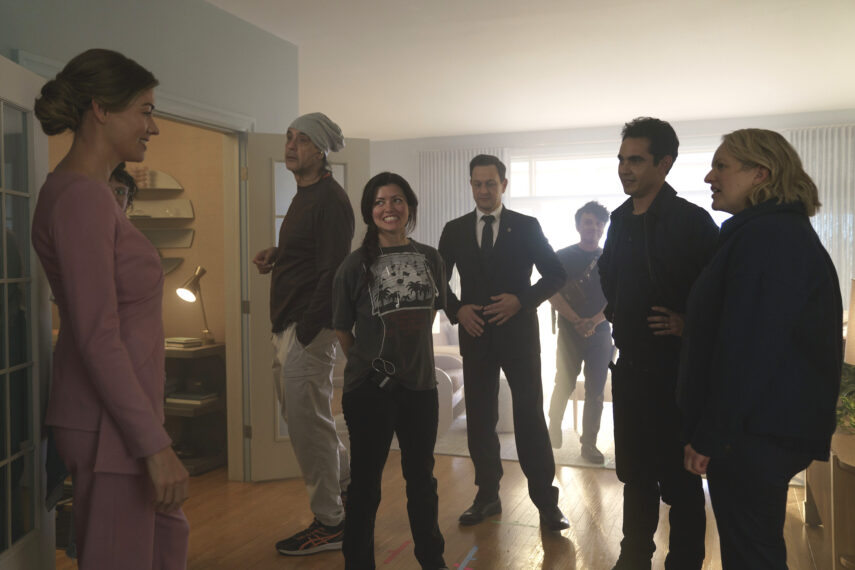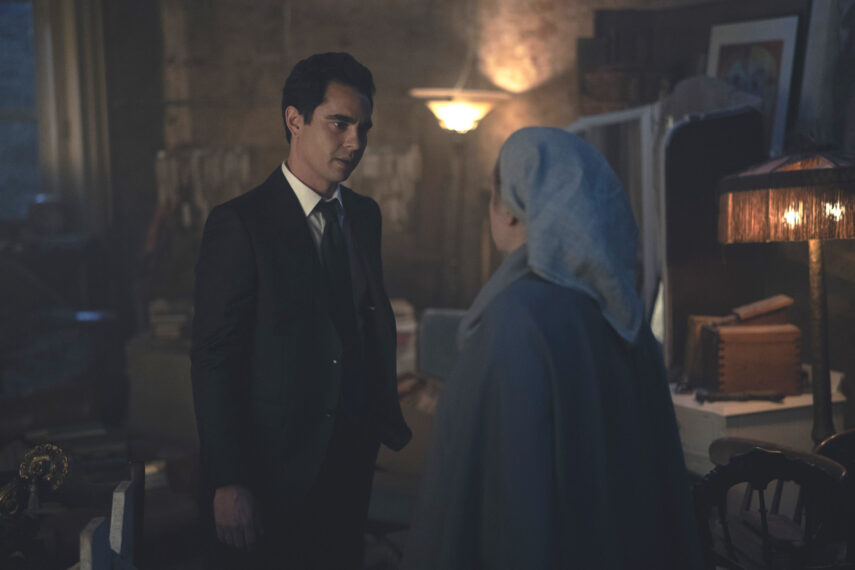‘The Handmaid’s Tale’ Delivers Nick Bombshell: Max Minghella Explains Major Betrayal

Q&A
[Warning: The following contains MAJOR spoilers for The Handmaid’s Tale Season 6 Episode 6, “Surprise.”]
The title of the April 29 episode of The Handmaid’s Tale, “Surprise,” sells the episode’s bombshell reveal short. June (Elisabeth Moss) wasn’t just surprised by what she overheard about Nick (Max Minghella) while hiding in a closet with him in Serena’s (Yvonne Strahovski) home, it took the air right out of her lungs. This is the turning point in June and Nick’s relationship that was always inevitable in this series, and their relationship will never be the same. In fact, it’s probably done for good.
June returned to Gilead on a secret mission with Moira (Samira Wiley) to help set up Mayday’s plot against the Boston commanders that frequent the Jezebel’s brothel. Janine (Madeline Brewer) was working there, and June and Moira were determined to help free all of the women while attacking Gilead’s leaders. The plan went sideways, resulting in June hiding out with Nick in New Bethlehem. The unexpected return of Nick’s father-in-law, High Commander Gabriel Wharton (Josh Charles), forced June to seek shelter at Serena’s. The next morning, Wharton arrived at Serena’s (his now-fiancée) home while June and Nick were there. They hid in a closet and heard Gabriel reveal to Serena that the commanders discovered the plot against Jezebel’s with Nick’s help. While June was hiding at Serena’s and waiting for Nick, Nick was pressured into revealing the truth about the Mayday plot. Jezebel’s was shut down, and the fate of every captive woman inside it was left hanging in the balance.
June was horrified by the betrayal, and Nick hung his head in shame as the episode ended. Moments before Wharton arrived, Nick was trying to convince June to run away with him. With their hopes for the future long gone, Max Minghella breaks down this game-changing development with TV Insider.
What was it like to dive back into Season 1 June and Nick in this episode’s flashback?
Max Minghella: It was a lovely idea, I thought, for a scene, and I always loved the design of Nick’s apartment from Season 1 and missed it. So it was quite fun to see the set again, like seeing an old friend. And I thought the scene was really well written, and I always loved doing a scene with Lizzie.

Disney / Steve Wilkie
And of course, it ties into him asking her to go to Paris later in this very game-changing episode for the relationship. Nick is always helping June in her rebellion, but he doesn’t really seem eager to get out of Gilead himself. Why is that?
I think that Nick, prior to this world, didn’t have any security in his life or any structure in his life. That has always been his Achilles heel. And then specifically in Season 6, Wharton is a huge part of it. It’s the first time there’s been a paternal figure to Nick that we’ve seen who actually makes him feel safe, for better or worse. And whether it’s the worst place to find security, I think there’s something about him that he’s been lacking in his life. I think a lot of these people who get led astray don’t have very strong father figures, and I think Wharton can take advantage of that.
I feel that Nick feels scared of Wharton, but feeling oddly connected to him doesn’t mean the fear isn’t there.
He is scared of him, but I think that he hasn’t had a strong male role model before. And obviously, it’s a very skewed one, but I think it just gives him some sense of security.
So in a way, he enjoys his relationship with Wharton? It feels good to him in some respect?
Whether it feels good to him, I don’t know if I’d say that. I don’t think Nick’s ever had the privilege in this show of having a period of comfort. That’s not been his story, really. But I think that in the past, he’s probably only had Waterford [Joseph Fiennes] and Lawrence [Bradley Whitford] as men to look up to as sort of paternal figures, and both of those people had obvious vulnerabilities to them in a way that Wharton probably doesn’t.
What is it about Nick that makes him kind of fold when he’s faced with these higher-up commanders? He does help June, so there is a rebellious side to him. But the second he’s alone with Waterford or Lawrence or Wharton, he feels compelled to follow these men a bit.
He’s also a survivalist. I think there’s a pragmatism to it, and certainly in a lot of the previous seasons. He said it quite well in this season to Sam Jaeger‘s character in one of the earlier episodes where he is like, “I’m no use to you if I’m dead.” He’s conscious of the fact that he has to have some play in the infrastructure in order to help June.
Does he really want to help take Gilead down, or does he only do it to help June?
I think up until this season, his sole purpose for integrating himself to the degree that he has has been to help June or to see June, really on just a primal level. The more access he has, the more knowledge he has of where she is, how to protect her, and how to connect with her. It’s hard to see each other under the circumstances of this TV show. And Season 6, things have changed a little bit. He has a wife that he does care about. He has a child coming. He has a responsibility there that he also feels a moral obligation to. And then Wharton, there’s something there, too, for him. And so I think he’s actually much more conflicted in this season in terms of his alliance of Gilead than he has been before.

Disney / Steve Wilkie
What is his opinion of Gilead at this point? Because he is helping June in the resistance against it, but he’s also not really eager to leave.
If he’d left, then he wouldn’t have been very useful. Up until this season, there’s been a pragmatism to why he’s made the decisions that he’s made, not just staying in Gilead, but lots of decisions that at first might seem strange or mercurial prove to have some kind of intention behind them. In Season 6, he’s just really torn between what the right thing to do is. And the decisions that he makes in this episode that are quite controversial are coming from a place of real confusion fundamentally as to what to do. At a certain point, he’s at a bit of a loss as to how to make this all hang together.
The episode’s ending reveals that in his earlier scene with Wharton, Nick revealed the Jezebel’s plot. How does Nick justify this to himself?
In the actual scene where that information is revealed by Nick to Wharton, it was important to me that it really felt like it was a no-win situation. At least in his mind, that there was nothing he could do. And even though I’m not going to defend his decision at all, nor do I expect anybody in the audience to sympathize with it, it was important to me that at least in the moment, it felt like there was no escape and that he didn’t have a choice. Sometimes people don’t think clearly under pressure. I think that’s an important thing that I kept thinking about shooting that scene is like, we’re not always perfect people on TV. We want everyone to do the right thing all the time. But I like that this show has always embraced 50 shades of gray in everybody.
And in that moment with Wharton, I imagine for Nick, it felt like if he didn’t tell the truth, he would die.
That’s the logic, yeah.
What is Nick’s opinion of himself now?
He’s back to old Nick, which is the self-esteem of a goldfish. I don’t think that he thinks a lot of himself. There’s a brief moment, I would say at the top of Season 6, where for the first time in history, I think Nick is feeling himself a little bit, and hopefully that’s articulated in the performance. But that is quickly dashed by all of this drama that’s happening.
How much does his helping refugee families reunite in New Bethlehem influence his sense of purpose this season?
I think he’s probably been quite surprised by his ascension through the ranks. I don’t think he’s ever been a character who’s had ambitions to be a high-ranking officer in Gilead. He said the line to Rita in an episode, “It’s the safest place to be, safest thing to be is being a commander in this structure.” But that’s a kind of new realization. I don’t think he ever planned for any of this.

Disney / Russ Martin
Things seem to kind of happen to Nick. That’s how Gilead is set up. These white men can’t ascend quite easily just by nature of how they were born.
Completely. Completely. And he’s a bit of a pawn, Nick, even within the Gilead universe. He’s not somebody who I see make a lot of leadership decisions. He tends to be told what to do.
When he gets to Serena’s house and he’s like, June, let’s go to Paris. Does he think that that kiss is maybe their last kiss?
Oh, I don’t think he’s thinking straight at all. He’s in a state of total maniacal panic, and I don’t think there’s anything structured about his thought at that point. Anxiety, anxiety, anxiety.
Does he know that Wharton is coming over to Serena’s and he is trying to get there before he does?
No, but I think he knows that stuff is going to hit the fan.
Things are closing in on him for sure. Tell me about filming that scene with Elisabeth where you’re in the closet and she hears Wharton reveal what Nick did.
For various production reasons, we ended up shooting that scene over the course of about five weeks. We had to keep dipping in to get another setup from it. It was a thing we kept coming back to was this moment of great tension and sadness for this character in this very surreal space. So it was a useful acting tool to check in with that. And it was wonderful what they did. It was very dynamic visually, and it was really fun.
With him having to sell out the Jezebel’s plot, do you think this storyline is revealing who Nick has always been, or revealing who he has evolved into?
I think there’s two things. It is definitely a product of circumstance and really a specific scene which forced this to happen. But I will say that fundamental to Nick’s DNA is somebody who came from a very specific background, where he didn’t have any education and he didn’t have any leadership in his life prior to Gilead. So he’s born of a very strange system and a misguided system, and one that he knows is misguided, but he doesn’t have a frame of reference for anything else. He’s a really good survivor. I don’t know if he’s the smartest person in the world. And I think that that has always been there a little bit. That’s what he can’t offer June, which Luke [O-T Fagbenle] can, is an intellectual connection. He doesn’t have that at all. A lot of the time he finds himself in situations because he doesn’t really have the tools to navigate this stuff. It was never taught to him.
Is there any coming back from this for June and Nick? What can we expect from him in these final episodes?
I’m not going to be able to answer that question [laughs], only because there’s no answer that doesn’t undermine the joy of where the story goes to. And I think it’s a really satisfying conclusion, and again, genuinely surprising.
The Handmaid’s Tale, Tuesdays, Hulu










